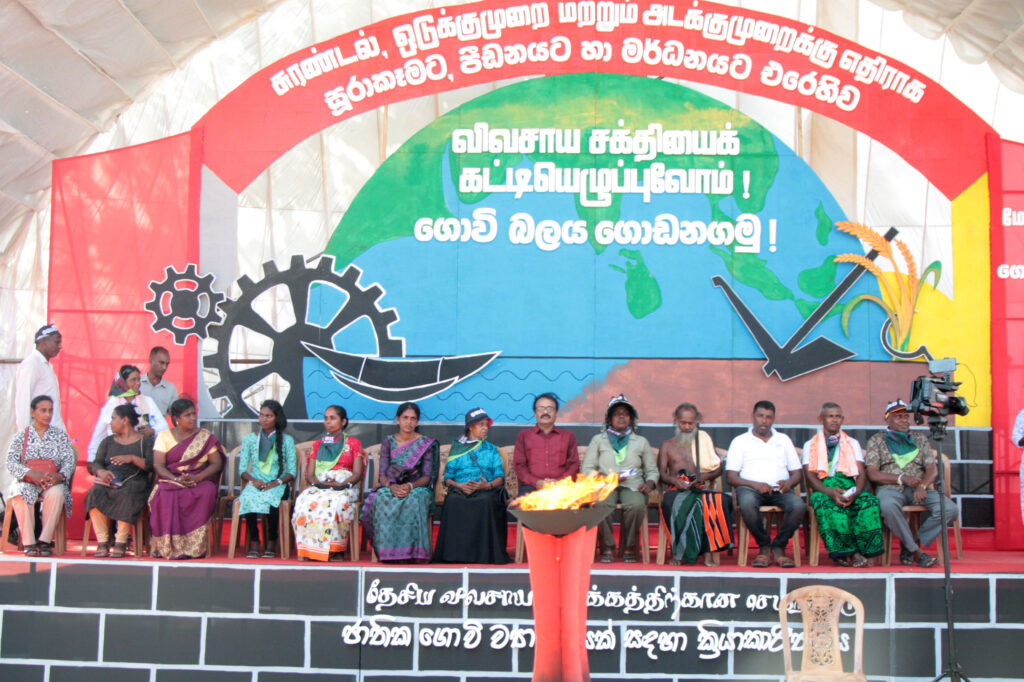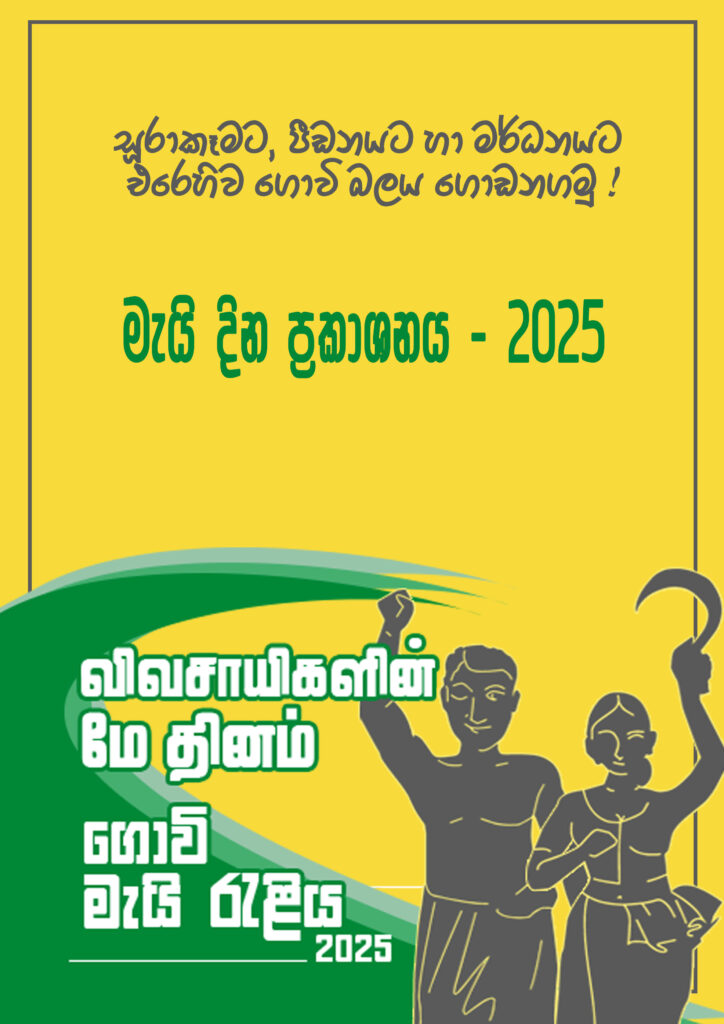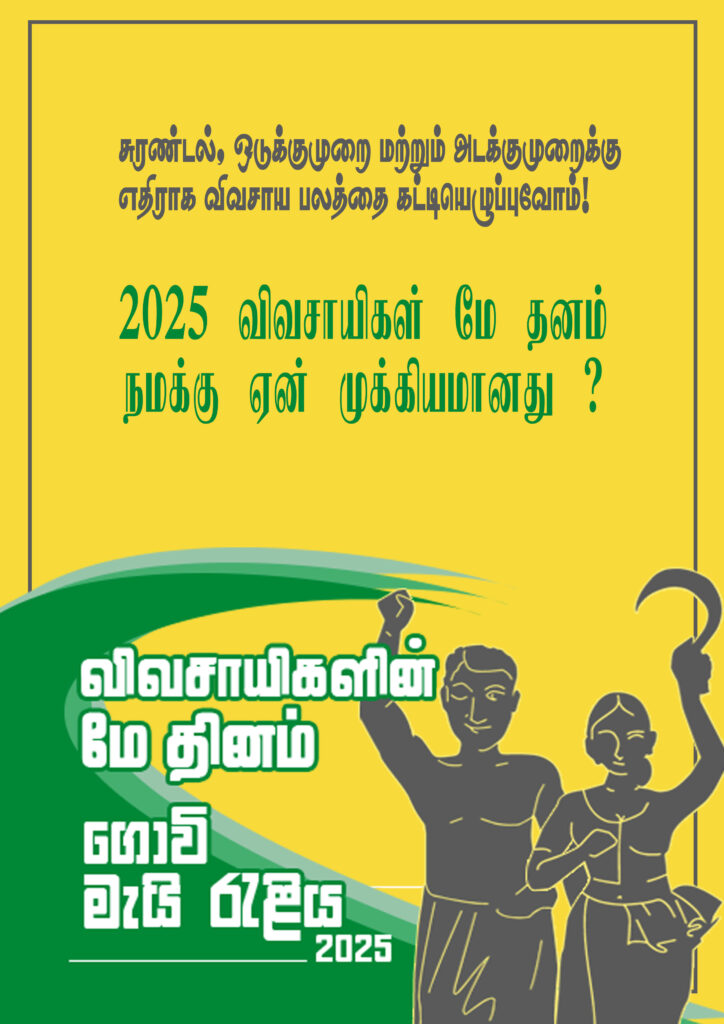MONLAR Warns Sri Lanka Risks Sacrificing Agriculture to Appease US Over Apparel Trade

The Movement for Land and Agricultural Reform (MONLAR) warned that the Sri Lankan government may be willing to sacrifice the country’s agricultural sector to secure favourable trade terms with the United States for the apparel industry. “We are concerned that in a bid to appease the Americans, and to get a ‘good deal’ for the apparel sector, the Sri Lankan government might be willing to sacrifice agriculture,” MONLAR declared at the 2025 Farmers’ May Day gathering in Mannar, where hundreds of rural farmers, workers, and activists assembled to voice their concerns and demands.
The warning comes as Sri Lanka faces a new economic dilemma. Recent US tariff hikes on Sri Lankan apparel have thrown the country’s main export industry into turmoil, threatening jobs for thousands of workers. MONLAR points out that this latest crisis is a direct result of an export-led economic model, promoted by the International Monetary Fund and World Bank since the 1970s, which has failed to protect rural livelihoods. For decades, as the rural economy faltered, many women and men who lost their land and income migrated to the garment sector or sought work overseas. With the apparel sector now under threat and options narrowing, rural families face heightened insecurity.
MONLAR’s May Day statement argues that the policies shaping Sri Lanka’s economic direction have consistently sidelined smallholder farmers, fisherfolk, and rural producers. They point to growing landlessness, indebtedness, loss of market access, and the erosion of traditional seed rights and knowledge systems as everyday realities for rural communities. Many small-scale producers, including women, have been pushed off their land and now work as labourers on large-scale farms run by export-oriented companies. In MONLAR’s view, the government’s willingness to negotiate Free Trade Agreements with the United States risks compounding these challenges. As US agricultural exports search for new markets due to declining access to China, Sri Lankan farmers, already battered by the 2022 economic crisis and IMF-prescribed austerity, would struggle to compete with heavily subsidised American products.
MONLAR’s message, echoed by farmers, women’s groups, fisherfolk, and plantation workers at the Mannar gathering, is that Sri Lanka’s rural sector cannot absorb another shock. They warn that any attempt to exchange concessions in agriculture for trade advantages in apparel would be disastrous for food sovereignty and rural livelihoods. Instead, they urge a fundamental shift in national priorities: policies must be designed to protect the interests of small producers, not large corporations or foreign markets.
The proposals put forward at this year’s Farmers’ May Day event are comprehensive. MONLAR calls for the cancellation of debts for farmers, fisherfolk, and small- and medium-scale producers, including microfinance loans, and for the creation of guaranteed state purchasing, storage, and distribution mechanisms to ensure fair prices. They demand an end to unjust taxes on agricultural equipment, action against destructive fishing practices, and a halt to environmental destruction and resource dispossession masked as green technology investments. The movement insists on protection for land and natural resource rights, the repeal of harmful trade agreements and laws, and the adoption of national agricultural policies based on environmental science and local needs. A core principle in their proposals is food sovereignty: the right of communities to control their own seeds, land, and food systems, and to build agricultural processes that are sustainable, resilient, and inclusive.
Women’s empowerment is at the heart of MONLAR’s vision for agrarian reform. The group calls for state recognition of women as landowners and value-adders in food production, leadership development for women and youth in farmer organisations, and legal protections for women’s livelihoods and participation. There is also a call for broader social justice measures, including a political solution to Sri Lanka’s national question, justice for victims of enforced disappearances, and the repeal of laws like the Prevention of Terrorism Act.
MONLAR and its allies insist that these demands are not mere slogans, but a call for an ongoing national movement to defend rural communities and transform Sri Lanka’s economic and political order.
“As the country faces external economic pressures and domestic instability, the message from Mannar is clear: only a united and empowered rural movement can safeguard the rights and futures of Sri Lanka’s farmers, fisherfolk, and working people. The 2025 Farmers’ May Day, with its urgent proposals and calls for unity, marks a pivotal moment in the struggle for justice and food sovereignty in Sri Lanka,” MONLAR said.
Read the May Day declaration in English , Sinhala and Tamil from following links
ALL CONTACTS
- No. 57, 1st Lane, Meda Welikada Road, Rajagiriya, Sri Lanka.
- +94 112 870 369
- monlar@sltnet.lk
- www.monlar.lk
SUBSCRIBE
Subscribe us to get latest updates of Sri Lankan Peasant movement
Error: Contact form not found.
- Monlar - Copyright 2024
- donations@ong.com
- volunteers@ong.com
- contact@ong.com













Leave a Reply